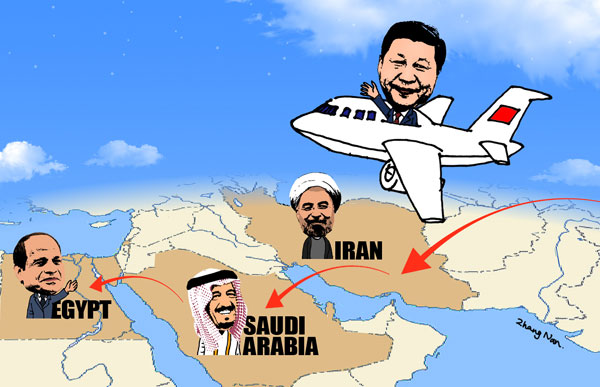
President Xi Jinping's trip to the three Middle Eastern countries - Saudi Arabia, Egypt and Iran - is the first in years for top Chinese leader personally getting involved in state diplomacy in this region. The trip is significant both for China and the regional countries in substantial terms in the areas of energy, security and economic matters.
For one thing, the tree countries are all heavyweights in the volatile region and play critical roles in the stability in the Middle East. Egypt is traditionally the biggest player in the Arab world and remains a force to reckon with despite the volatility following the Arab Spring revolution three years ago. Saudi Arabia is the Sunni leader in the Islamic world and currently leading a coalition of muslim countries fighting terrorism. Iran, as the leader of the Shiite community, has a population of nearly seven million with a potentially tremendous market and is a major player both in fighting the IS terror organization and the Syria crisis.
The Chinese leader's tour also came at a critical juncture. The IS is spreading its terror to Europe and Asia such as France and Indonesia, despite the intensification of US air raids and the participation of Russian forces. Saudi Arabia and Iran recently have been at a diplomatic war and literally severing their ties, partly due to long-term religious differences and political distrust. At the same time, Iran is enjoying newly found fresh air following the lifting of international sanctions.
On a bilateral level, the significance of President Xi's visit is mutual - there's every reason for Beijing to further its ties with the Middle East and the regional countries are also warmly welcoming a stronger Chinese presence in this region.
China relies on overseas market for 60% of its annual oil consumption and the Middle East is the major source of its energy import. As China works to reduce its reliance on coal to against increasingly intolerable air pollutions, the consumption of oil and gas is expected to increase. A reliable relationship with oil-producing countries like Saudi Arabia and Iran is naturally a necessity.
China also needs to work with those countries in pushing for its grand initiative of "One Belt One Road", which is to build road and economic links from China to Europe by focusing on infrastructure investment and manufacturing capacity building. China is handling with an overcapacity in its manufacturing sector, which can potentially be exported to developing countries who desperately need to strengthen such a sector.
Xi's trip to Iran is especially well-timed, right after the removal of economic sanctions on Iran by the international community over its controversial nuclear program. The President's direct engagement with Iranian leaders will give China leg up in doing business in this investment-hunger country. China is the largest trading partner of Tehran and is now also the first country which sends its top leader to the new land of opportunities.
For regional countries, they have been calling for a greater Chinese role in the region, given China rapidly becoming the second largest economy and the largest trading nation of goods in the world. Saudi Arabia is even looking at a prospect that, as the US reduces its oil import with more and more self-reliance, China will inevitably become the largest importer of Saudi oil products. Strengthening the all-round relationship with China is completely in the national interests of Saudi Arabia. No wonder the local media is urging the country to learn from their rivals including Israel and Iran to educate more Chinese-speaking researchers and establish China study centers to better understand China.
Egypt, following years of chaos, is struggling to secure financial assistance and investment, something few countries but China can offer. Egyptian Ambassador to Beijing Madgy Amer said the two Beijing and Cairo will sign deals worth at least 1.7 billions of US dollars to support Egypt's dwindling foreign reserve and financial lending ability to businesses.
Many observers have admitted that China enjoys strong "soft power" in the Middle East thanks to Chinese non-intervention policy and respect for individual countries to explore their own way of development. Besides, China emphases stability above almost everything, refusing to engage itself in games of playing one against another in a region of multiple players.
There're calls for China to play a larger role, even a military one, in maintaining the regional order and fighting terrorism. That thinking is not entirely unjustifiable. For example, China is the largest investor in Iraq but there's little it can do when the country is savaged by the IS and its interests under threat. But it is a demonstration of habitual mentality which stresses very much the employment of military power, something China loathes.
China will certainly encourage countries like Saudi Arabia and Iran to seek reconciliation in stead of confrontation, as that's the common interest for every nation including China as well as the regional rivals. Stability is necessary for economic growth, which in turn boosts stability. Given time, the Chinese approach of diplomacy and negotiation could prove more impactful than bombing and regime changes.